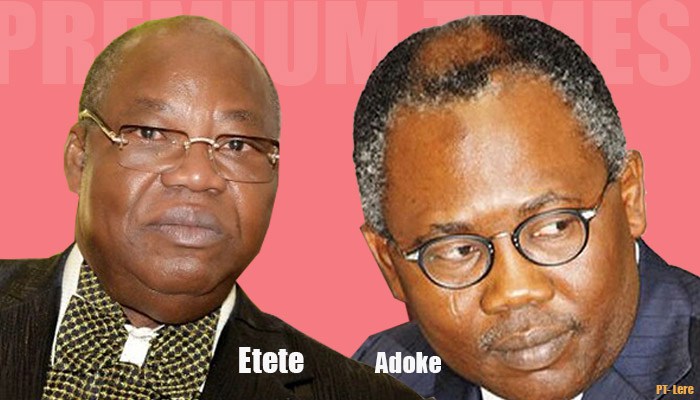
Nineteen years after it was first awarded to a controversial firm, OPL 245 has reverted back to the federal government.
The block, considered the richest in Africa, is estimated to contain over 9 billion barrels of crude and even larger volume of gas reserves.
For comparison, at Nigeria’s current OPEC oil output quota of 2.2 million barrels per day, OPL 245 alone can provide all Nigeria’s oil production needs for over 11 years.
Formed on April 20, 1998, Malabu was awarded the block 9 days later by the Sani Abacha government, PREMIUM TIMES investigations revealed.
For the next 12 years the oil block would change hands between Malabu, oil giant Shell and the Nigerian government as all parties schemed for control. That disagreement started in 2001 when the Nigeria government first cancelled the award of the block to Malabu and gave it to Shell, investigations showed. The government would later revoke the allocation from Shell.
In 2010, President Goodluck Jonathan appeared to resolve the controversy when he directed that the block be given to Malabu.
Having done several technical works on the block and realising how rich it was, Shell would not let go and was willing to play ball.
Along with Italian oil giant Eni, the Anglo-Dutch firm paid $1.097 billion into a Nigerian government account in 2011 for the block.
Over 70 per cent of the payment ($801 million) was controversially transferred to Dan Etete, the man who as petroleum minister in 1998 first awarded the block to Malabu. Mr. Etete would later transfer more than half of this sum into accounts of phoney companies controlled by Aliyu Abubakar, a man believed to have acted as a front for politically exposed persons including Mr. Jonathan and his attorney general, Mohammed Adoke, as well as Shell and Eni staff.
The way the money paid by the oil giants was laundered would later lead to investigations in at least five countries culminating in various corruption charges.
REASONS FOR REVERSAL
In asking the Federal High Court to order that the oil block revert to the federal government, the anti-graft EFCC narrated its investigations.
An EFCC operative, Ibrahim Ahmed, told the court in an affidavit that the agency commenced investigations in 2012 after it received a petition “from shareholders of Malabu Oil and Gas alleging conspiracy to commit fraud, forgery of board resolutions to alter share structure of the company.”
PREMIUM TIMES had reported how at inception, Malabu was owned by Mohammed Sani (son of late dictator Sani Abacha, 50 per cent), Kwekwu Amafegha (fictional character created by Mr. Etete, 30 per cent) and Hassan Hindu (wife to Nigeria’s then Ambassador to the U.S., Hassan Adamu, 20 per cent).
EFCC investigations would later confirm this to be true.
Mr. Etete, who owned 30 per cent of Malabu at inception connived with a self-appointed company secretary, Rasky Gbinigie, to falsify board resolutions in order to take control of the oil block. It was his claim of sole ownership that led him into negotiating deals on behalf of the company leading to the $1.1 billion paid by Shell and Eni.
However, the fraudulent manipulation of Malabu share holdings was not the only reason for the EFCC’s demand before the high court; from inception, Malabu was a fraud, the EFCC found.
Messrs. Abacha, Etete and Adamu “were barred by extant laws from engaging in any form of business by virtue of their office,” the EFCC operative told the court.
“They (Messrs. Abacha Etete and Adamu) used their positions to confer unfair advantage on themselves and cronies in allocating OPL 245 to themselves without due process.”
Therefore, according to the EFCC, not only were Malabu shares fraudulently manipulated by Mr. Etete, Malabu itself illegally obtained the oil block from the Nigerian government.
OPL 245 was awarded to Malabu “against all known Government regulations” and “before a formal application was submitted by the company,” the EFCC found.
The Department of Petroleum Resources, DPR, to whom the court returned the bloc on Thursday, had also said that due process was not followed in 1998 when Malabu was awarded the oil block.
SHELL, ENI’s ROLES
The EFCC operative also told the court that investigations showed that Shell had always known of Malabu’s fraudulent past even before the 2011 deal.
After it was awarded the block, Malabu knew it had no technical expertise. Mr. Etete, therefore, approached Shell as a partner.
Shell knew that the allocation of the oil bloc was fraudulent and “the procedure adopted by the owners of Malabu Oil and Gas Ltd was fraught with fraud but went ahead to consummate the transaction,” the anti-corruption commission found.
The EFCC operative also said investigations showed that the $1.1 billion paid by Shell and Eni in 2011″was bribe to Dan Etete and his cronies.”
The commission confirmed PREMIUM TIMES earlier reports that it cooperated with security officials from Italy, Netherlands, U.S., UK and Switzerland in its investigations.
Italian authorities have since filed charges against Shell, Eni, staff of the companies, as well as Mr. Etete for the scandal. Italian authorities have also asked the Nigerian government to hand overMr. Abubakar, the bagman, for questioning for his role in the shady deal.
JUDGE’S RULING
In its ex-parte originating summons, the EFCC sought for an interim order that OPL 245 be managed by the DPR “on behalf of the Federal Government of Nigeria pending conclusion of investigation and prosecution” of officials of Shell, Eni, Malabu and others who partook in the deal.
The EFCC had in December filed money laundering and fraud charges against ex-attorney general Adoke, Mr. Etete and Mr. Abubakar. Charges are, however, yet to be filed in Nigeria against Shell and Eni.
Sources in the oil industry have also told PREMIUM TIMES that no activity is currently going on OPL 245 due to the various investigations.
On Thursday, Justice John Tsoho granted the order sought by the EFCC, thus effectively handing over OPL 245 back to the Nigerian government.
END

Be the first to comment